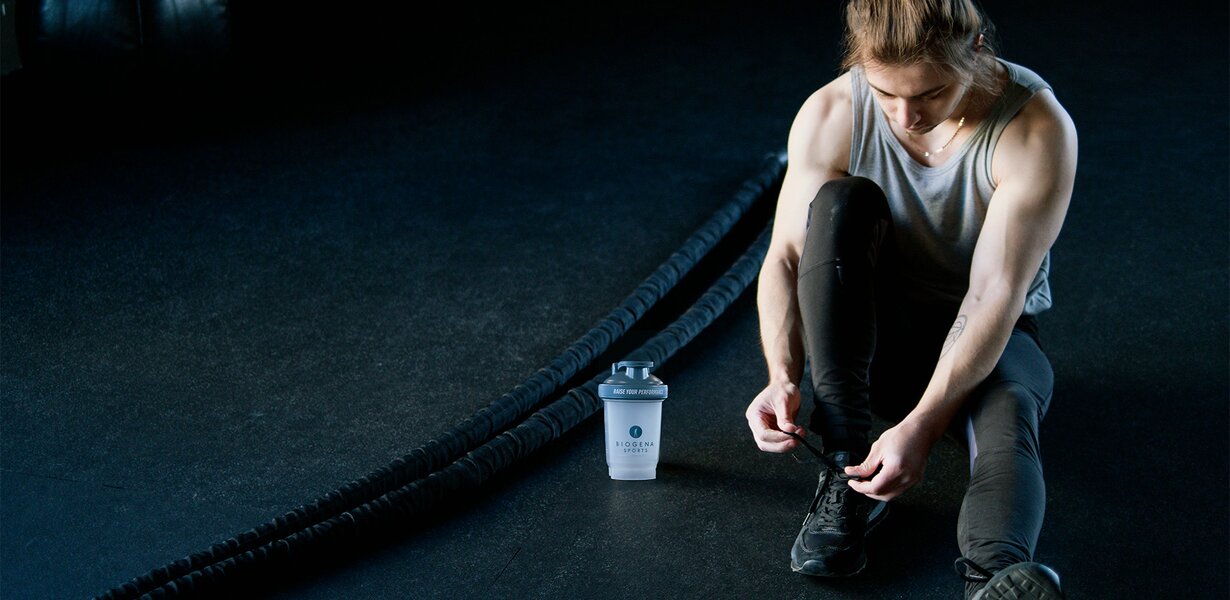If you exercise regularly, you've probably asked yourself this question before: Should I drink my protein shake before or after my workout? The answer isn't as clear-cut as you might think – because both options have their advantages. In this article, you'll learn what's behind the optimal protein intake, when is the best time to drink your shake and what you should keep in mind when making it.
Are protein shakes even useful?
Protein shakes are a simple and effective way to provide your body with high-quality protein – especially when it comes to supporting muscle building, recovery or strength gains. They are particularly practical if you don't always have the time or opportunity to consume enough protein through your normal diet. But be careful: protein shakes are not a substitute for a healthy and balanced diet.
Important: A shake is not a must – but it is a useful supplement for many training goals. Provided, of course, that the quality is right.
When is the best time to drink a protein shake?
Studies have not found any significant differences in terms of the ideal time of consumption. However, scientists agree on one thing: the body benefits most from protein when it is consumed around the time of training. Whether you drink your shake before or after your workout depends largely on your personal goals and daily routine. The most important thing is to ensure that you consume enough protein throughout the day – ideally 1.2–2.2 g of protein per kilogram of body weight if you exercise regularly.
A protein shake before your workout can give you a little energy boost and at the same time ensure that you have enough amino acids in your blood during exercise.
A protein shake before training can be useful if you...
- ...you want to train on an empty stomach but don't want to start completely without energy.
- ...you want to supply your body with amino acids in advance so that they are available during training.
- ...you train early in the morning and don't have time for a large meal.
| Advantages: | Disadvantages: |
|
Quickly available proteins can reduce muscle breakdown during training – especially if you are on a calorie-restricted diet. |
Eating or drinking a shake shortly before exercising can cause feelings of fullness or discomfort during training, depending on how sensitive your stomach is. |
|
Even before you start training, you already have essential amino acids in your blood that are available to your body during exercise. |
The effect on muscle growth is not necessarily better than with a protein shake afterwards – the daily balance remains decisive. |
|
Ideal for anyone who doesn't like to train on a full stomach but still needs nutrients. |
Protein shakes after training: effects, benefits and disadvantages
After training, muscle regeneration is in full swing – now your body needs building blocks to repair damaged muscle fibres and build new ones. A protein shake immediately after exercise provides quickly usable protein. After training, your body is particularly receptive to nutrients, especially proteins and carbohydrates.
| Advantages: | Disadvantages: |
|
You can make targeted use of the so-called anabolic phase (muscle-building phase). |
It is important to note that a shake alone does not replace a nutritious, protein-rich meal. |
| Quick and easy if you don't feel like a big meal right after training. | If you wait too long to consume protein, you may be wasting recovery potential. |
|
Supports recovery immediately after exercise. |
The best sources of protein for before and after exercise
Basically, you can split protein into these types:
- Classic whey protein – rich in BCAA and ideal as a pre- and post-workout shake
- Soy protein – also rich in BCAA and suitable for both before and after training
- Casein protein – tends to be slow to digest and therefore ideal for consumption before bedtime
- Alternative protein sources such as hemp, pea or rice protein – contain BCAA and are quick to digest
The type of protein and its quality are much more important for your training success than when you consume it.
In addition to dietary supplements and protein shakes, you can also meet your protein requirements through natural foods. It is important to choose easily digestible and protein-rich options that provide your body with optimal support, depending on whether you consume them before or after training.
Protein-rich foods before training
Before your workout, you should choose foods that are easy on the stomach but still provide high-quality protein. However, you should focus more on carbohydrates. Smaller portions eaten 1–2 hours before training are ideal:
- Low-fat quark or cottage cheese with fruit or oatmeal
- Yoghurt (preferably Greek) with honey, nuts or berries
- Eggs or an omelette with wholemeal bread
- Tofu with steamed vegetables and rice
- Turkey breast on wholemeal toast or in a wrap
The combination of protein and carbohydrates not only provides you with amino acids, but also energy for your workout.
Protein-rich foods after training
After training, your body is receptive and needs high-quality protein to regenerate muscles and support growth. Make sure you eat a balanced meal with protein and carbohydrates:
- Grilled chicken or fish with quinoa or sweet potatoes
- Lentils or chickpeas with vegetables in a curry or stew
- Scrambled eggs or omelette with vegetables and wholemeal bread
- Skyr or Greek yoghurt with banana and nuts
- Tempeh or tofu with wholemeal rice
Tip: After exercise, you can enjoy a larger meal – after all, your body needs nutrients for regeneration and muscle building.
Conclusion: When is the best time to drink a protein shake?
There is no clear-cut ‘right’ or ‘wrong’ answer. Both times are just as valid – and ultimately it comes down to your personal needs and goals:
- Before training, if you need energy quickly, want to maintain your muscles or don't want to train on an empty stomach.
- After training, to optimally support recovery and muscle growth.
The important thing is that you consume enough protein in the form of high-quality amino acids throughout the day, in good quality and in line with your lifestyle. Whatever you decide, your body will thank you with more power, better recovery and better training results in the long term.
Frequently asked questions about ideal protein intake:
That depends on your goal and your daily routine. A shake before training can give you energy and reduce muscle breakdown during exercise, especially if you train on an empty stomach. A protein shake after training specifically supports recovery and muscle building. The most important thing is that you consume enough protein around your workout – exactly when is flexible.
Protein shakes are particularly useful if you need protein around your workout or if you don't get enough protein in your normal diet. Many people take them directly after their workout, but they can also be a good source of nutrition as a snack between meals or for breakfast. The decisive factor is your total protein intake throughout the day.
Yes, as long as you pay attention to the quality of the shakes and incorporate them into a balanced diet. Daily protein shakes are generally not a problem for healthy people – however, they should not replace meals permanently, but rather be a practical supplement, especially when you have increased needs due to exercise or dieting.
If you want to lose weight, a protein shake can help you reduce cravings and still feel full. A protein shake is ideal as a meal replacement (e.g. breakfast or dinner) or after training to prevent muscle loss during a diet. Important: Make sure you choose a low-calorie shake with little sugar and sufficient protein.
Sources:
AnovonA. Chemical Score – Biologische Wertigkeit. https://anovona.de/chemical-score/
Deutsche Gesellschaft für Ernährung e.V. (2020): Positionspapier zur Proteinzufuhr im Sport. https://www.dge.de/presse/meldungen/2020/positionspapier-zur-proteinzufuhr-im-sport/
Deldicque L. Protein Intake and Exercise-Induced Skeletal Muscle Hypertrophy: An Update. Nutrients. 2020 Jul 7;12(7):2023. doi: 10.3390/nu12072023. PMID: 32646013; PMCID: PMC7400877. https://pubmed.ncbi.nlm.nih.gov/32646013/
Jäger, R., et al. (2017): International Society of Sports Nutrition Position Stand: protein and exercise. J Int Soc Sports Nutr 14, 20. https://pubmed.ncbi.nlm.nih.gov/28642676/
König D., et al. (2020). Proteins in sports nutrition. Position of the working group sports nutrition of the German Nutrition Society (DGE). Ernahrungs Umschau. Bd. 67(7): 132–9. https://www.ernaehrungs-umschau.de/fileadmin/Ernaehrungs-Umschau/pdfs/pdf_2020/07_20/EU07_2020_M406_M413_1.pdf
Leidy, H.J., et al. (2015): The role of protein in weight loss and maintenance. Am J Clin Nutr, 101(6), 1320S-1329S. https://pubmed.ncbi.nlm.nih.gov/25926512/
Schoenfeld BJ, Aragon AA, Krieger JW. The effect of protein timing on muscle strength and hypertrophy: a meta-analysis. J Int Soc Sports Nutr. 2013 Dec 3;10(1):53. doi: 10.1186/1550-2783-10-53. https://pubmed.ncbi.nlm.nih.gov/24299050/
Tanner S., et al. (2018): Recent Perspectives Regarding the Role of Dietary Protein for the Promotion of Muscle Hypertrophy with Resistance Exercise Training. Nutrients. 10(2):180. https://pubmed.ncbi.nlm.nih.gov/29414855/
Westerterp-Plantenga MS, Lemmens SG, Westerterp KR (2012). Dietary protein - its role in satiety, energetics, weight loss and health. Br J Nutr. Bd. 108 Suppl 2:S105-12. https://pubmed.ncbi.nlm.nih.gov/23107521/










